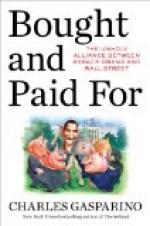Graduation day was almost at hand, but the dress was still unfinished. There was considerable work yet to be done on it. The nearer came the important event, the more nervous and exhausted Mrs. Blaine showed herself. She had already had several fainting spells and on one occasion the girls were so alarmed that they thought the end had come, peacefully and suddenly. But the widow rallied and, in spite of her daughter’s protests, insisted on continuing with her work. Marvelling at her determination, touched by this pathetic exhibition of maternal devotion, Virginia would sit silently for hours, her eyes filled with tears, watching the dear, tired fingers swiftly and skillfully plying the needle.
One evening the little family was assembled in the stuffy parlor back of the store. Mrs. Blaine, tired after a long day’s toil, had sunk back in her armchair, dozing. Her head had fallen forward on her breast, a piece of hemming on her knee. In order not to disturb her, the girls conversed in low tones. Virginia was reading, her favorite occupation, while her elder sister, engaged perhaps more usefully, was darning stockings.
Suddenly the front door bell rang. With an anxious glance at her mother to make sure that the noise had not disturbed her, Fanny tip-toed out of the room and presently returned, followed by James Gillie. The shipping clerk entered clumsily, in his characteristic, noisy style. Jocularly he cried out:
“Good evening, everybody!”
Virginia quickly held up a protesting finger, while Fanny exclaimed angrily:
“Don’t you see that mother’s asleep?”
Throwing his hat and coat on a sofa, the newcomer sat down gingerly on a chair. With a glance at the old lady, he demanded:
“What’s she sleepin’ here for? Why don’t she go to bed?”
Virginia, always irritated by his gaucheries, pretended not to hear and went on with her book, but Fanny answered him. In a whisper she said:
“She’s tired out.” Anxiously she, added: “I don’t like the way she looks to-day. I think it’s the heart. I’ll telephone the doctor to-morrow—”
Jimmie gave a snort of disapproval.
“Pshaw! What’s the good?” he exclaimed contemptuously. “Those doctors can’t do nothing; they’re the worst kind of fakers. All they do is to look wise, scribble on a bit of paper some words no one can read—not even the druggist—and charge you a two-spot. It’s to laugh!”




